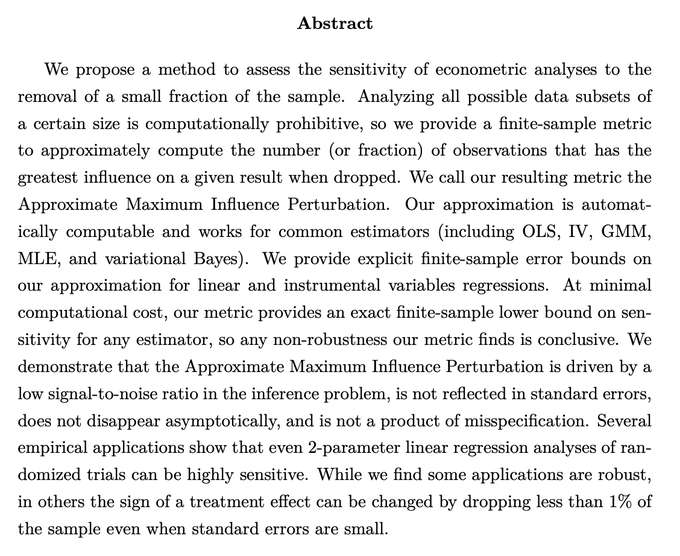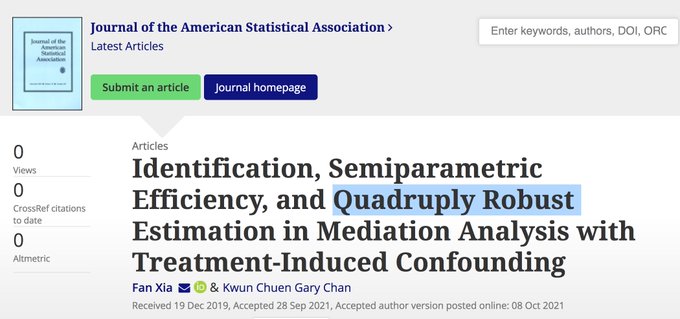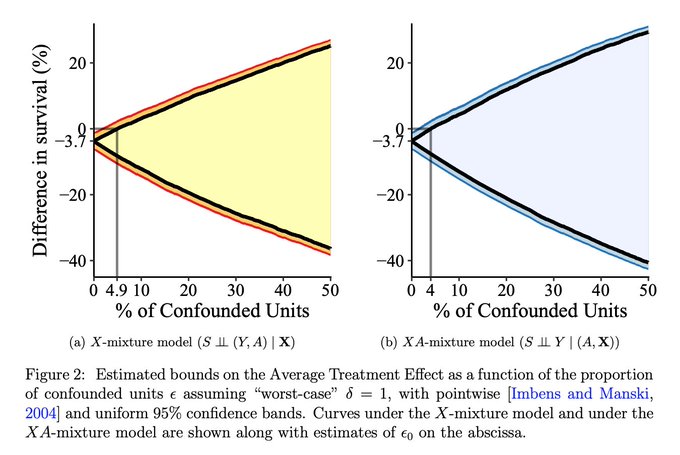
Edward Kennedy
@edwardhkennedy
Followers
4,768
Following
593
Media
288
Statuses
1,986
assoc prof of statistics & data science @CMU_Stats @CarnegieMellon . interested in causality, machine learning, nonparametrics, criminal justice, public policy
Pittsburgh, PA
Joined June 2018
Don't wanna be here?
Send us removal request.
Explore trending content on Musk Viewer
Adalet
• 229495 Tweets
#4MINUTES_EP7
• 110778 Tweets
Chester
• 109053 Tweets
ベイマックス
• 108916 Tweets
Merchan
• 87219 Tweets
Jean Carroll
• 67100 Tweets
Eagles
• 66452 Tweets
#2KDay
• 65265 Tweets
HAPPY BIRTHDAY TANNIE
• 54862 Tweets
#dilanpolat
• 42720 Tweets
Franco Escamilla
• 36228 Tweets
Ayşenur Ezgi Eygi
• 33350 Tweets
Packers
• 29860 Tweets
#CristinaMostraElTitulo
• 22644 Tweets
Ganesh Chaturthi
• 14787 Tweets
Bafana Bafana
• 14541 Tweets
Tesehki
• 13943 Tweets
Barcola
• 13148 Tweets
Chaine
• 12323 Tweets
Alina Habba
• 10927 Tweets
Go Birds
• 10887 Tweets
Skylar
• 10060 Tweets
Last Seen Profiles
I wrote a review & tutorial illustrating how I think about semiparametric / doubly robust / TMLE / DML methods:
It builds on workshops I've given in the past using these slides:
(next one's at ACIC in May: )
7
106
398
"Statistics, contrary to popular perception, isn't really about facts; it's about how we know or suspect or believe that something is a fact. It has more in common w/philosophy (eg epistemology) than accounting. Statisticians are applied philosophers."
-
@stephensenn
#statsquotes
5
123
391
"There are two types of statisticians: those who do causal inference and those who lie about it." - Larry Wasserman
#statsquotes
2
70
218
New paper alert!
"Sensitivity analysis via % of unmeasured confounding"
SA is absolutely crucial for causality: holy grail is finding one that's interpretable *&* flexible
@bonv3
& I propose contamination model approach, w/effect bds across % confounded
4
45
159
“It’s funny: lots of people who aren’t statisticians do statistics. We don’t do chem/bio; we don’t go to a lab & start filling test tubes. Stats is something you can do if you have a PC. Lots of people think they can do it well, but don’t.”
-
@robtibshirani
#statsquotes
19
45
138
Causal effects aren't identified from observational data w/o nonidentified assumptions. If you don't wish to join Fisher & say causality from obs data is illegitimate (incl cigarettes -> lung cancer) then you must recognize need for untestable assumptions
- J Robins
#statsquotes
1
17
138
I like this rule of thirds:
“When you’re chasing a big goal, you’re supposed to feel good 1/3 of the time, OK 1/3 of the time, & crummy 1/3 of the time.”
Sometimes we feel down when we get stuck on something, but that’s a crucial part of doing interesting & challenging research
5
29
136
Eric TT is one of my all-time favorite statisticians & people
He’s that person you meet & instantly think “wow I want to be like them...”
A true Renaissance man making incredibly creative advances in theory, w/deep connects to science, & unbelievably encouraging & kind to all
We are excited to honor alumnus and
@Wharton
professor Dr. Eric Tchetgen Tchetgen as the recipient of the 2020 Myrto Lefkopoulou Distinguished Lectureship! He will deliver a virtual lecture on Sept 17, 1-2pm. More info here:
5
23
173
2
19
130
Identification of average causal effects, when all confounders are measured:
E(Y1)
= E{ E(Y1 | X) }
= E{ E(Y1 | X, A=1) }
= E{ E(Y | X, A=1) }
Step 1 by iterated expectation, step 2 by no unmeasured confounding & positivity, step 3 by consistency.
Simple but very powerful
6
12
130
If you’re worried about what happens when 1% of your sample disappears, wait till you hear what happens when 1% is subject to unmeasured confounding! :)
@bonv3
3
12
118
So excited about this paper exploring "Counterfactual Risk Assessments, Evaluation, and Fairness" led by star PhD student
@AmandaCoston
, & w/
@achould
:
Turns out that causal inference ideas are extremely useful when assessing fairness in risk prediction
1
31
109
There’s no way you can just sit down and do a ‘big thing,’ or at least I can’t... Statistics is a wonderfully forgiving field: you don’t have to be the brightest person in the world or work day & night; all you have to do is get an idea and keep at it.
- Brad Efron
#statsquotes
0
11
84
.
@manjarips
& I have a new paper on nonparametric estimation of population size:
This is a classic problem w/ a long history & lots of important applications - our paper focuses on how to flexibly & efficiently incorporate complex covariate information
1
18
83
Related: be suspicious if you see someone reducing statistics to simplistic "do this, never that" rules
(eg: never dichotomize! no propensity scores! condition on everything!)
In my experience it's rarely that black & white - if you start questioning you uncover lots of gray
"Statistics, contrary to popular perception, isn't really about facts; it's about how we know or suspect or believe that something is a fact. It has more in common w/philosophy (eg epistemology) than accounting. Statisticians are applied philosophers."
-
@stephensenn
#statsquotes
5
123
391
7
18
78
This is great! I have found that defining target parameters nonparametrically - outside of any possibly wrong model assumptions - one of the most freeing & important things you can do in stats
2
7
78
Great news! Betsy is a hero of mine -- if you ever want an example of work that is creative, exceptionally well-written, and deep (both substantively & theoretically), you won't go wrong picking one of her papers at random.
1
5
73
“The point of rigour is not to destroy intuition; it should destroy bad intuition while clarifying & elevating good intuition. Only w/ a combo of rigorous formalism & good intuition can one tackle complex math problems; the former for fine details, the latter for the big picture”
1
7
69
I learned a beautiful result recently from
@BetsyOgburn
@oleg_sofrygin
@ildiazm
@mark_vdlaan
's amazing paper on causality in networks:
A CLT still holds for non-iid network data, as long as everyone has << sqrt(n) friends!
(pic: )
3
8
71
Double robustness is often explained as: you get 2 chances at picking correct parametric model. But the chances of this are slim.
The really cool thing abt DR estimators is their errors are products: & so smaller than either error alone. Thus you can get fast rates/CIs even w/ML
4
6
66
I’m so excited about this work - the capture-recapture problem is super interesting with lots of applications across diverse fields (epi, human rights, ecology, etc), & also has some subtle ties to causal inference. Our paper will be out soon!
Congratulations to Manjari Das on her wonderful thesis proposal on “Non-parametric doubly robust estimation of population size with conditional capture-recapture designs”! Advised by Edward Kennedy
@edwardhkennedy
1
1
22
1
5
67
Jamie Robins:
- was 58 when first groundbreaking work on higher order influence functions came out ()
- was 67 when recent HOIF advances appeared in Ann Stat ()
4
6
61
“Observational methods are used everyday to answer pressing causal questions that can't be studied w/RCTs (eg drugs, sex, smoking, alcohol)... It's important to develop obs methods to estimate these effects to prevent further needless suffering & death.”
- J Robins
#statsquotes
0
21
60
Cool new paper by
@leqi_liu
!
Mean optimal trt rules aren't robust: sensitive to small % w/ extreme outcomes
Marginal median opt rules are unfair in different way: my treatment depends on *your* outcomes
We study fair+robust median optimal trt rules:
2
8
57
Huge congrats to
@AmandaCoston
on her
@Meta
PhD research fellowship!
Amanda's a joint student
@mldcmu
&
@HeinzCollege
@CarnegieMellon
doing amazing work on fairness in ML, causal inference & more
Check out her papers & more here:
1
4
54
I'm not a fan of how these Lalonde-style papers are framed
When you add observational controls to an experimental treatment arm, **you are changing the target parameter** (even w/ATT)
We shouldn't necessarily expect the "observational" estimates to match the "experimental" ones
3
3
54
"Most scientists study some aspect of nature; we study scientists, or at least scientific data. Statistics is an information science, the first and most fully developed information science."
- Brad Efron
#statsquotes
2
11
54
So excited to share new work w/star
@CMU_Stats
PhD student Alan Mishler ():
We show how to post-process arbitrary risk predictors so they satisfy more meaningful *counterfactual* fairness constraints, & study statistical properties
0
6
54
And now there's an easy-to-use R package! (on github & cran)
.
@manjarips
& I have a new paper on nonparametric estimation of population size:
This is a classic problem w/ a long history & lots of important applications - our paper focuses on how to flexibly & efficiently incorporate complex covariate information
1
18
83
1
12
51
"Statistics is intertwined with science and mathematics but is a subset of neither."
- Jamie Robins
#statsquotes
1
10
51
this is why i celebrate a little when i post to arxiv, and then try to forget whatever happens afterwards.
publication outcomes are noisy & not great signals of quality. lots of bad papers get into good journals, and lots of good papers get rejected.
2
0
51
Causal effects via modified treatment policies are so useful for flexible & robust causal inference
Now
@ildiazm
has extended them to the longitudinal setting!
Yet another novel & thoughtful but also super clearly written paper by Iván
3
12
51
"Statisticians are engaged in an exhausting but exhilarating struggle with the biggest challenge that philosophy makes to science: how do we translate information into knowledge?" -
@stephensenn
#statsquotes
2
14
51
This work by
@CMU_Stats
PhD student
@iwaudbysmith
is *extremely* cool
Surprisingly, you can do safe, anytime-valid causal inference - even in complex observational studies, where asymptotics usually dominate! Has important implications for modern online data collection & beyond
Super excited to share this work with
@edwardhkennedy
,
@darbour26
, Aaditya Ramdas, and Ritwik Sinha on confidence sequences for causal effects!
arxiv:
code:
4
27
112
1
5
49
“Individual men are insoluble puzzles, but in aggregate they become a mathematical certainty. You can't foretell what 1 man will do, but you can say what an avg # will be up to. Individuals vary but %s remain constant. So says the statistician.”
- Sherlock Holmes
#statsquotes
1
9
49
"I guess I’d like to be remembered as somebody who produced really good students and who helped change the image of statistics in the sense that lots of people now work on serious applied problems and help solve them." - Steve Fienberg
#statsquotes
1
2
49
very excited for this
@SAMSI_Info
workshop on causal inference in december:
So many amazing speakers! including
@deaneckles
@AviFeller
@laura_tastic
@ljk50
@Lizstuartdc
and lots of others
2
10
48
New review of incremental effects, with
@bonv3
, Alec McClean, & Zach Branson!
Usual effects compare all vs none exposed - but this doesn't make sense if some are destined to be exposed. Can instead ask "what'd happen if trt were slightly more likely?"
0
10
48
Updated version of our CATE minimax rates paper is out!
We settle the minimax story *regardless* of propensity vs regression complexity (eg, PS can be less smooth)
We also show how minimax rates change, depending on which regression fn is parametrized
1
9
46
Super exciting work by Matteo
@bonv3
!
Really advances the state-of-the-art for causal inference w/continuous treatments
- new methods *and* guarantees for effect estimation *and* sensitivity analysis
(cts trts are everywhere in practice but much more difficult than discrete)
My advisor
@edwardhkennedy
and I have posted an article on continuous trt effects estimation:
We study nonparam models where the dose-response curve has its own smoothness, which may differ from that of the outcome regression or cond dens of trt given X.
4
18
112
0
8
46
Hopefully this isn't because earlier iterations were just poorly explained...
Slides have been updated, still available at same link:
And here is corresponding review paper:
3rd? time in 5 years I've seen
@edwardhkennedy
do his np causal inference workshop but still manage to learn something new every time.
0
2
30
1
4
44
Check it out! Fun paper with
@dscharf3
@raziehnabi
@bonv3
& others on flexible methods for sensitivity analysis to common "no unmeasured confounding" assumptions
Semiparametric Sensitivity Analysis: Unmeasured Confounding In Observational Studies. . Learned so much from my co-authors:
@raziehnabi
,
@edwardhkennedy
Ming-Yueh Huang,
@bonv3
, and Marcela Smid.
1
7
46
0
7
41
A small sampling from a very memorable review I received, on a submission to JASA:
Corollary 1: this is not a mathematics journal. Please explain what "inf" , "lim inf" and "sup" mean
page 13: What is RKHS regression? nerver heard about this
page 14: what does "debiased" mean?
4
0
42
This is why I love combining bds *with* sensitivity analysis. You get the whole picture: pt identification @ one extreme, agnostic bounds at the other
Best of both worlds & middle ground in between!
Nice example in
@bonv3
% unmeasured confounding paper:
@JeffDenning
@paulgp
@PaulaAureo
@VC31415
@elie_tamer
But is this the fault of econometricians? Or do applied referees not like bounds because they are wide and would rather believe more precise estimates based on potentially untenable assumptions?
1
0
8
2
1
41
@CandiceMajewski
How can stats help tell us "what if" and not "what is"?
What tools work best when stats is hard? What does "best" mean & what does it look like?
1
0
41
Come work with us at
@CMU_Stats
!
CMU is a really special place & I've learned so much from the amazing community here.
We're hiring on both tenure track (all ranks) & teaching track (asst profs):
Tenure track:
Teaching track:
1
13
39
Very related:
I loved working on this paper w/
@leqi_liu
exploring median optimal treatment regimes:
It seems hard to motivate the mean over the median here - when they align, you can pick either, and when they don't, the median is often much more useful
3
7
38
Really looking forward to this visit!
Here's a tweet-sized version of my talk:
May 3rd see Edward Kennedy of Carnegie Mellon University on the subject of Nonparametric Causal Effects Based on Incremental Propensity Score Interventions.
Friday May 3 from 12 PM - 1 PM
HCP Conference Room 224E
@HMSHCP
1
3
19
1
4
38

































































































































































